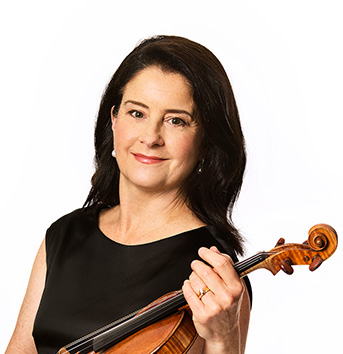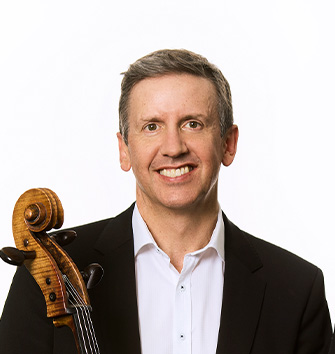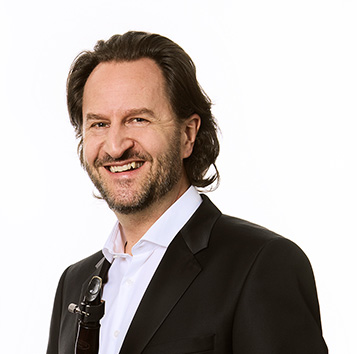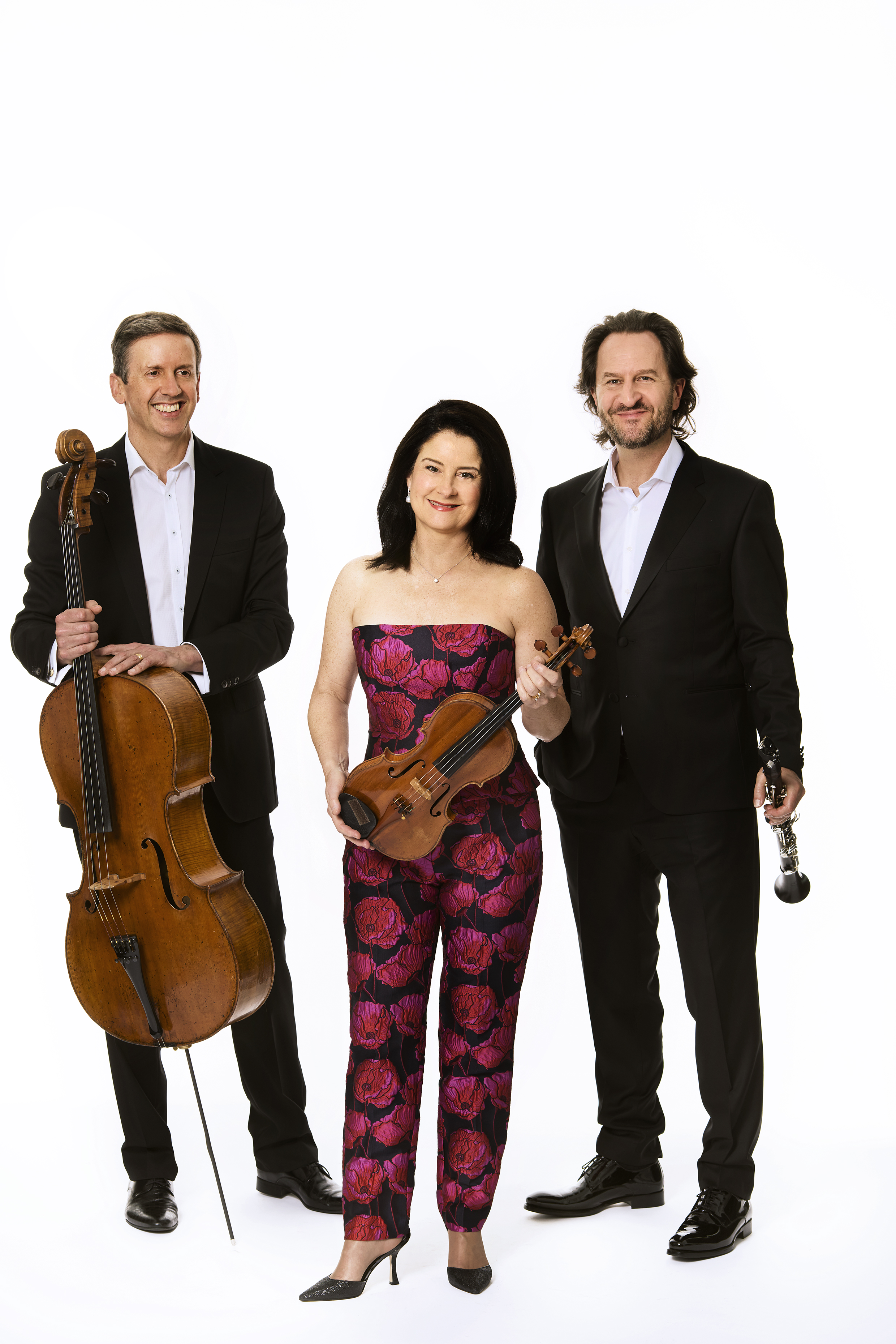The Australia Ensemble UNSW has been a cornerstone of chamber music excellence in Australia since its foundation in 1980.
Artist profiles

Paul Stanhope
Artistic Chair
Paul Stanhope is a Sydney-based composer, conductor and educator. His compositions have had prominent performances in the UK, Europe, Asia as well as North and South America. After studies with Andrew Ford, Andrew Schultz and Peter Sculthorpe in Australia, Paul was awarded the Charles Mackerras Scholarship which enabled him to study at the Guildhall School of Music in London in 2000.
In May 2004 Paul’s international standing was confirmed when he was awarded first place in the prestigious Toru Takemitsu Composition Prize. He has been awarded five APRA/Australian Music Centre Art awards in Instrumental, Orchestral, Choral and Vocal music categories – most recently for his Requiem which was premiered in 2021. He was also the first composer to receive a Sidney Myer Creative Fellowship in 2013. Paul recently received the David Harold Tribe symphonic composition prize for his Trombone Concerto, which was commissioned and premiered by the West Australian Symphony Orchestra.
In 2010 Paul was Musica Viva Australia’s featured composer, receiving nation-wide performances by the Pavel Haas Quartet, the Choir of Trinity College, Cambridge and the Atos Piano Trio from Berlin. Paul’s music has also been featured at the Vale of Glamorgan Festival (Wales) in 2009, The City of London Festival in 2011 and at the Australian Festival of Chamber Music in 2016. In 2018 a new Piano Trio was premiered by eight competing trios from around the world as part of the Melbourne International Chamber Music Competition.
2014 saw the premiere of Jandamarra: Sing for the Country, a music-drama based on the life of the Western Australian Indigenous resistance hero in collaboration with librettist Steve Hawke and members of the Bunuba nation in North Western Australia. Written for large choral and orchestral forces as well as singers, actors and dancers from the Bunuba Community, it was premiered by the Sydney Symphony Orchestra (SSO) and Gondwana Choirs and has since had a return performance in October 2019, presented by the Sydney Conservatorium of Music. Jandamarra has been recognized as a milestone in Australian composition.
Recent works include a clarinet trio written for Ensemble Liaison and a new vocal work for Katie Noonan’s Australian Vocal Ensemble (AVE). In 2024 the Australian String Quartet will premiere a new piece co-written by Paul and the Indigenous singer Dr Lou Bennett AM at the Amsterdam String Quartet Biennale.
In addition to Paul’s role as Artistic Chair at the Australia Ensemble UNSW, Paul is an Associate Professor of Composition at the Sydney Conservatorium of Music, The University of Sydney where he is also director of the Sydney Conservatorium Chamber Choir.

Dimity Hall
Violinist
Dimity Hall is well known to national and international audiences as a member of both the Australia Ensemble UNSW and the Goldner String Quartet, with whom she has performed, toured and recorded extensively. Dimity’s outstanding performances as a guest artist with the Australia Ensemble from 1986 led to the creation of a seventh core position in 1992.
After studying with Alice Waten in Sydney, Dimity undertook postgraduate students with Herman Krebbers in Amsterdam on a Netherlands Government Scholarship, performing in recital and as a casual member of the Royal Concertgebouw Orchestra for concert, tours and recordings.
In Australia, Dimity has performed with the Australian Chamber Orchestra as Principal Second Violin, guest Leader and soloist, with the Sydney Symphony as guest Principal, and as guest Concertmaster with the Australian Opera and Ballet, Melbourne and Adelaide Symphony Orchestras. Dimity made her solo debut with the Sydney Symphony in 2002 performing Vaughan Williams’ The Lark Ascending, later recording the work for ABC Classics. She has been soloist with the Canberra Symphony Orchestra, Brisbane Camerata of St John and in 2013 will perform the Brahms Double Concerto with the Woollahra Philharmonic Orchestra and her husband, Julian Smiles.
Dimity was a juror for the 2003 Melbourne International Chamber Music Competition, and coaches young chamber musicians through Musica Viva, the Sydney Conservatorium and Australian Youth Orchestra. In 2008 and again in 2012, she and Julian Smiles combined with contestants in the Chamber Music section of the Sydney International Piano Competition.

Julian Smiles
Cellist
Julian Smiles has for over 30 years been a central figure in cello performance and teaching in Australia. On graduating from the Canberra School of Music at the age of nineteen he was appointed principal cellist with the Australian Chamber Orchestra and rapidly gained prominence as a chamber musician in performances for Musica Viva Australia, Kathryn Selby and Friends and at the Huntington Estate Music Festival In 1991 he was invited to join the Australia Ensemble UNSW, and in 1995 formed the Goldner String Quartet with colleagues Dene Olding, Dimity Hall and Irina Morozova. With these two chamber groups he has performed to critical acclaim at major venues and festivals throughout the world, made over 30 CDs on leading labels, and premiered many works by Australian and international composers.
Julian’s appearances at festivals over the years have included artistic collaborations with musicians such as Piers Lane, Tasmin Little, Edgar Meyer, Alexander Sitkovetsky, Amy Dickson and James Crabb. He has also been engaged as a collaborative artist in the chamber music round of the Sydney International Piano Competition of Australia on numerous occasions.
Julian is active as a soloist with numerous concerto appearances. During 2018 Julian’s high standing as a performer was recognised by the Canberra Symphony Orchestra, as their inaugural “Artist in Focus”. In this role he performed recitals and appeared as soloist with his wife Dimity Hall and pianist Piers Lane in performances of the Beethoven Triple Concerto. He has also premiered works for solo cello by eminent Australian composers such as Carl Vine, Mark Isaacs and Ross Edwards.
Having studied with Nelson Cooke and renowned cellist and teacher Janos Starker, Julian has developed a system of cello playing based on thorough and ongoing analysis of musical and technical issues that sees him sought after as a teacher and chamber music coach. He has held teaching positions at the Australian Institute of Music and Canberra School of Music, and is currently Senior Lecturer and Coordinator of Cello at the Sydney Conservatorium of Music.
He has also served as a juror for a number of major competitions, including the Melbourne International Chamber Music Competition in 2007, the Gisborne International Music Competition in 2019 and the ABC Young Performers Awards in 2021.
Julian plays on an 1827 Lorenzo Ventapane cello.

David Griffiths
Clarinettist
David Griffiths is a member of two of Australia’s leading chamber music ensembles, the Australia Ensemble UNSW and Ensemble Liaison. He also holds the position of Associate Professor of Music (Clarinet) and Coordinator of Chamber Music at the Melbourne Conservatorium of Music, the University of Melbourne. A passionate educator and performer, he has presented masterclasses and performances in Asia, Europe, United States, the Middle East and Australia including a critically acclaimed debut in Carnegie Hall’s Weill Recital Hall. As a soloist he has appeared with the Melbourne Chamber Orchestra, Tasmanian Symphony Orchestra, Sydney Symphony Orchestra, Orchestra Victoria, Australia Ensemble UNSW, Shanghai Radio Orchestra, Macau Orchestra and the Monash Academy Orchestra. As a member of Ensemble Liaison, he curates and performs an annual three-concert series at the Elisabeth Murdoch Hall at the Melbourne Recital Centre which is currently in its 16th season. He has also performed with the New Zealand, Goldner, Tinalley, Acacia, Flinders and Australian String Quartets, the New York Wind Soloists, and the Southern Cross Soloists. He has collaborated with many leading artists including Nemanja Radulović, Ray Chen, Anthony Marwood, Henning Kraggerud, Emma Matthews, Cheryl Barker, Peter Coleman-Wright, David Jones, Paul Grabowsky, Tony Gould, and has appeared at the Australian Festival of Chamber Music in Townsville, Port Fairy Festival, Lucerne Festival and the Pacific Music Festival in Sapporo, Japan.
He has held positions as Associate Principal Clarinet with the Melbourne Symphony Orchestra, Principal Clarinet of the Macau Orchestra and Principal Clarinet of the Shanghai Radio Orchestra. He has appeared as Guest Principal clarinet with all of Australia’s major symphony and opera ballet orchestras along with the Australian Chamber Orchestra. He was also Co-Principal of the 2000 National Repertory Orchestra (US), acting Principal of the Singapore Symphony Orchestra, the Malaysian Philharmonic and has performed with the New World Symphony, the Hong Kong Philharmonic, the China Philharmonic, the Pacific Music Festival Orchestra and the Paragon Ragtime Orchestra.
Some recent highlights include a performance of John Adams’ Gnarly Buttons clarinet concerto with the Australia Ensemble UNSW, the Weiland Concerto with the Melbourne Chamber Orchestra, a collaboration with accordion virtuoso James Crabb, Mozart’s Clarinet Quintet and Concerto at the 3MBS Mozart Marathon and the complete chamber works of Brahms in one day in collaboration with Timothy Young, Svetlana Bogosavljevic and the Australian String Quartet.
David’s recordings with Ensemble Liaison of Messiaen’s Quartet for the End of Time for the Melba Recordings label and Trios of Brahms, Beethoven and Bruch for the Tall Poppies label have won high praise from critics around the world. He is a Backun Clarinet performing artist.
David Griffiths appears courtesy of the Melbourne Conservatorium of Music, the University of Melbourne
“Clarinetist David Griffiths performed the work with flawless technique, and an exquisite sound. His altissimo register was particularly stunning, as was his sensitive phrasing in the slow middle section of the work.” Adelaide Advertiser
“David Griffiths was a superb soloist, his dynamic range including some sublime pianissimo and his facility demonstrated in the recurring cadenzas.” The Age
Griffith's silky tone and easy execution of the work's sparkling virtuosity quite exceptional.” The Australian
"an impassioned and committed performance ... not just technically superb but spiritually intense too." The Classical Review
“a refined, cogent reading, intimate and beautifully weighted.” Sunday Times (UK)
"Plays...with an innate sense of style and finely calibrated emotion..." GRAMOPHONE (UK)
